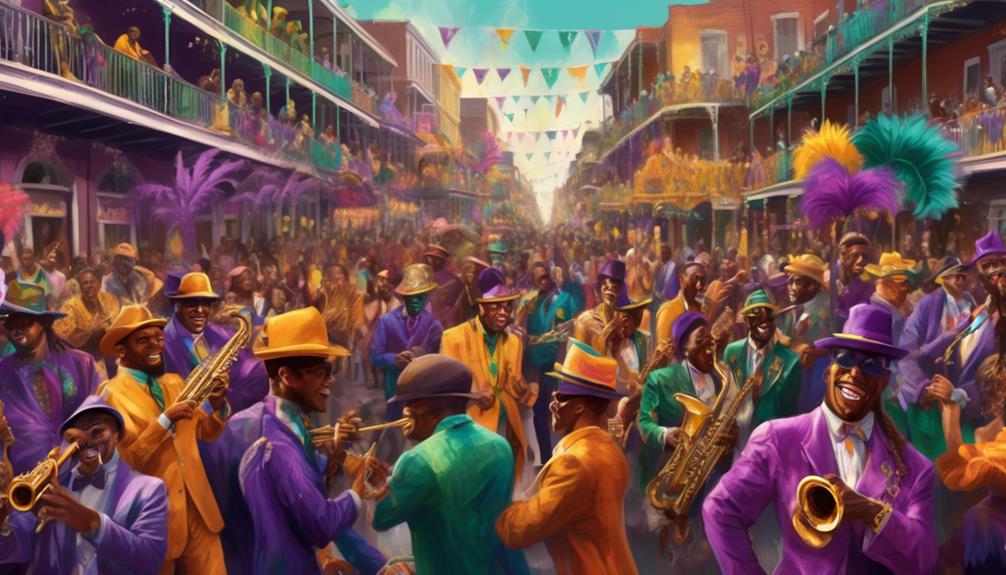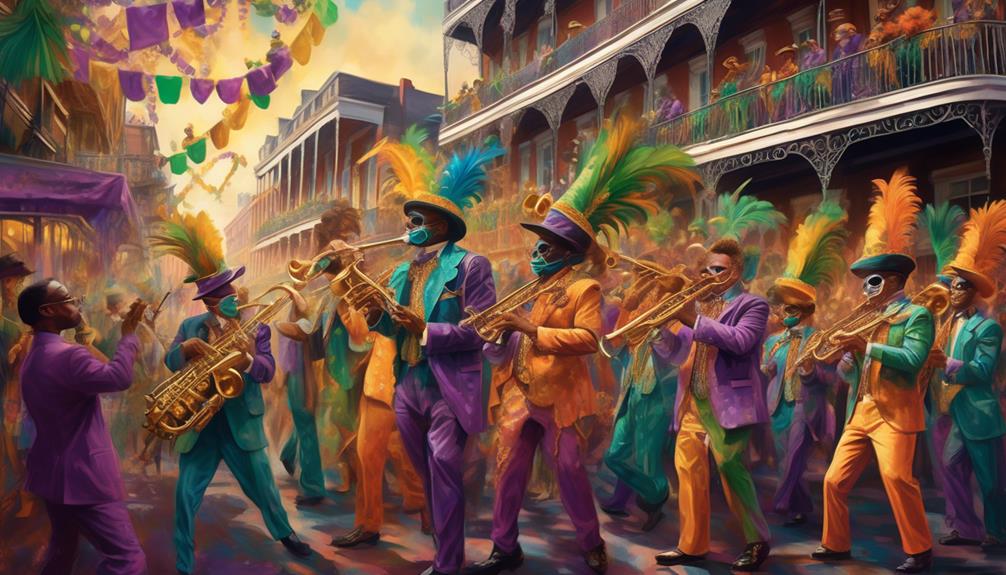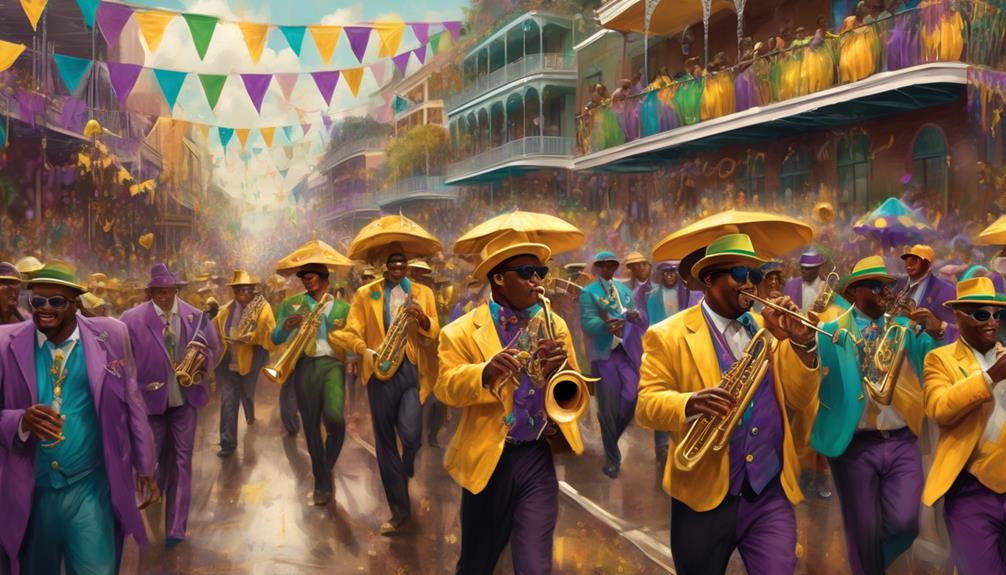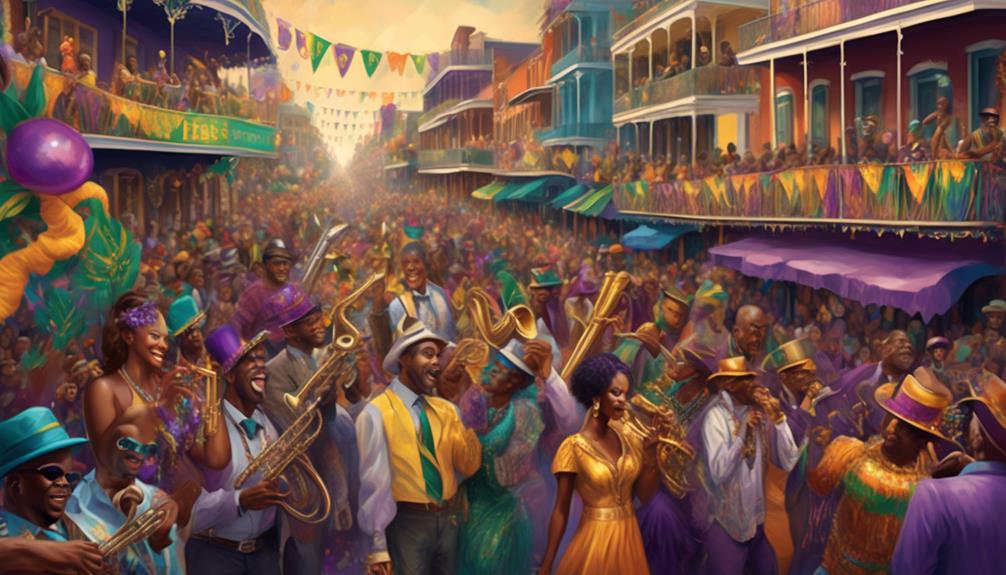
By some strange coincidence, you've probably found yourself wondering about the connection between two of New Orleans' most iconic cultural events: Mardi Gras and the Jazz Fest.
In the vibrant, music-filled streets of the Big Easy, it's easy to see how one might think that the raucous celebration of Mardi Gras could have given birth to the city's equally exuberant Jazz Fest. However, while both Mardi Gras and Jazz Fest share a love for celebration, music, and New Orleans culture, they each have unique roots and traditions.
As we untangle the fascinating history of these two events, you'll discover just how complex and intertwined the cultural tapestry of New Orleans truly is. But does one really originate from the other? Well, let's find out.
Key Takeaways
- The New Orleans Jazz & Heritage Festival (Jazz Fest) was founded in 1970 and has experienced significant growth in attendance over the years.
- The festival draws inspiration from the vibrant spirit of Mardi Gras, incorporating elements such as brass instruments, costumes, and dances into its performances.
- Jazz Fest has had a profound cultural impact, fostering a revival of Louisiana Folklife traditions and promoting the local heritage and economy.
- The festival's founders, Davis and Allison Miner, had a vision for celebrating the unique culture of New Orleans, and Jazz Fest has served as a model for other music festivals and Jazz celebrations across the country.
The Birth of New Orleans Jazz
Diving into the birth of New Orleans Jazz, it's essential to note that the New Orleans Jazz & Heritage Festival, first held in April 1970, was a pivotal moment in showcasing this iconic genre to the world. The brainchild of George Wein, the festival was envisioned as a culturally significant event, and so the Heritage Festival and Foundation was established to safeguard its legacy.
From a humble beginning of just 350 attendees, Jazz Fest soon exploded in popularity. Your attendance would've been amongst the 80,000 by 1975, a testament to the magnetic allure of Louisiana music and culture. Jazz Fest isn't just about New Orleans Jazz; it's a Mardi Gras of music genres, featuring world-renowned artists and the best of local cuisine, arts, and crafts.
You would've heard the iconic sounds of the Preservation Hall Jazz Band, felt the powerful beats of Brass Band, and been moved by the soulful melodies of legendary New Orleans musicians. From Congo Square to the grand stages, the spirit of Louis Armstrong echoes in every performance.
Jazz Fest has become an inseparable part of New Orleans, a celebration of its vibrant heritage and a testament to the city's enduring love for music.
Mardi Gras: A Historical Insight
Before you immerse yourself in the pulsating rhythm of Jazz Fest, it's worth taking a trip back in time to understand the origins of Mardi Gras, a riotous carnival celebration that has deeply influenced the city's culture and festivities. Since 94, Mardi Gras has been a highlight on New Orleans' calendar. It's a vibrant mix of parades, costumes, and street parties, with Mardi Gras Indians adding a unique flavor to the festival.
Now, think about the New Orleans Jazz & Heritage Festival, commonly known as Jazz Fest. It didn't start until 1970, but it quickly became a symbol of the city's music heritage. It's a celebration of music, but it's more than that. It's a homecoming, a reunion, a symbol of New Orleans' resilience, particularly after Hurricane Katrina.
The connection between the two festivals is undeniable. Mardi Gras' energy and spirit have influenced Jazz Fest, shaping its character and appeal. So, when you're tapping your feet to the music at Jazz Fest, remember, you're part of a tradition that goes back to the wild, riotous celebrations of Mardi Gras. You're part of New Orleans' vibrant cultural heritage.
Influence of Mardi Gras on Jazz

Drawing on the vibrant spirit of Mardi Gras, Jazz in New Orleans has been deeply influenced, shaping not just the city's music scene but its cultural identity as a whole. The French Quarter, the heart of Louisiana's cultural celebrations, pulses with the rhythm of jazz during Mardi Gras and Jazz Fest alike.
As Jazz Fest expanded, it absorbed the exuberant energy of Mardi Gras, fusing it with the rich history of the New Orleans Jazz and Heritage. As a result, the music festival has become a symbol of the city's vibrant cultural fabric. This fusion takes form in the following ways:
- The use of brass instruments, a staple in Mardi Gras parades, is prominent in Jazz Fest performances.
- The cultural traditions of Mardi Gras, like the vibrant costumes and dances, add color to Jazz Fest.
- The spirit of community and unity that Mardi Gras is known for is echoed in Jazz Fest.
- The celebration of local heritage, a common thread between Mardi Gras and Jazz, is accentuated during the festival.
In essence, the celebratory spirit of Mardi Gras has left an indelible imprint on New Orleans' Jazz scene.
Evolution of New Orleans Jazz Fest
Let's journey back to April 1970, when the New Orleans Jazz Fest first sprang to life with performances by luminaries like Mahalia Jackson and Duke Ellington. It was a new venture, a brainchild of George Wein of the Newport Jazz Festival, Quint Davis, and Allison Miner. They envisioned a festival that celebrates the richest musical heritage of New Orleans and highlights local artists.
The festival initially drew a modest crowd of 350. But, like the city's famous Mardi Gras, the Jazz Fest evolved into a significant cultural event. It expanded to multiple weekends, attracting hordes of music enthusiasts. By 2001, the festival's attendance had skyrocketed to over 650,000, making it one of the world's most celebrated cultural events.
The Jazz Fest is more than just a festival; it's a testament to New Orleans' vibrant local music scene. Over the years, it has featured prominent local artists, including Professor Longhair, Fats Domino, The Neville Brothers, and Wynton Marsalis. Each year, as the festival takes place, it continues to weave the rhythm and soul of New Orleans into an unforgettable musical tapestry.
Cultural Impact of Jazz Fest

While you're basking in the rhythm and soul of the Jazz Fest, it's impossible to overlook the profound cultural impact this event has had on the city of New Orleans and beyond. Held annually at the Fair Grounds Race Course, Jazz Fest has evolved into one of the world's premier jazz festivals. It's a vibrant celebration of Louisiana's rich cultural tapestry, attracting artists and music lovers from around the globe.
The cultural impact of Jazz Fest is profound and multi-faceted:
- Jazz Fest has fostered a revival of Louisiana Folklife traditions, bringing them to a global audience.
- The festival's multiple stages, featuring artists from Duke Ellington to Ellis Marsalis, have cultivated a deep appreciation for jazz and its roots.
- The Heritage Fair and Heritage Foundation play a key role in preserving and promoting Louisiana's unique cultural heritage.
- Jazz Fest has also contributed significantly to the local economy, generating revenue and creating jobs.
This beloved event is more than just music—it's a potent symbol of New Orleans' cultural vitality and resilience, a beacon for the city's past, present, and future.
Comparison: Mardi Gras Vs. Jazz Fest
In the heart of New Orleans, you'll find two of the city's most vibrant celebrations, Mardi Gras and Jazz Fest, each offering a unique blend of culture, music, and tradition.
Mardi Gras is a carnival-like spectacle of parades and costumes, reflecting traditional New Orleans culture with its lively street parties. It is a pre-Lenten celebration that attracts tourists from around the globe, contributing significantly to New Orleans' cultural identity and economy.
On the other hand, Jazz Fest, founded by George Wein of the Newport Folk Festival, spans two full weekends in late April and early May, drawing music enthusiasts worldwide. It showcases a broad palette of music styles, from traditional jazz to gospel, blues, and more. You'll find live performances by both local and international artists at evening concerts, making it a haven for music lovers.
Both festivals also offer a taste of Louisiana cuisine, with food vendors serving up local favorites from gumbo to crawfish. Whether you're a fan of traditional carnival celebrations or diverse music genres, you'll find a unique and memorable experience in both Mardi Gras and Jazz Fest.
The Continuing Legacy of NOLA's Jazz Fest

Building on the shared cultural significance of Mardi Gras and Jazz Fest, it's fascinating to explore the enduring legacy of Jazz Fest in the New Orleans community.
From its inaugural year, Jazz Fest was a resounding artistic success. Founders Davis and Allison Miner had a vision of a festival that would celebrate the unique culture of New Orleans, and they indeed accomplished it.
Jazz Fest's first year marked a turning point for the city. It was a celebration of local food, music, and art that had never been seen before. But it didn't stop there. By the second year, the Fest expanded to two weeks, drawing in even more attendees.
The continuing legacy of NOLA's Jazz Fest can be observed in:
- The growing popularity of Jazz Fests across the country, including New York.
- The yearly increase in attendance, proving the Fest's enduring appeal.
- The continuous support for local food and culture.
- The recognition and respect it brings to the genre of Jazz.
Today, Jazz Fest is a testament to the enduring spirit and culture of New Orleans and a beacon for lovers of Jazz worldwide.
Frequently Asked Questions
Who Started New Orleans Jazz Fest?
George Wein, Quint Davis, and Allison Miner started the New Orleans Jazz Fest in 1970. They aimed to promote Louisiana's music, culture, and heritage, attracting thousands and boosting the city's tourism.
Is Mardi Gras a Jazz Festival?
No, Mardi Gras isn't a jazz festival. It's a vibrant carnival with parades and parties, very different from Jazz Fest. Jazz Fest specifically celebrates music, including but not limited to jazz. Got it?
What Is Considered the Birthplace of Jazz?
No, Mardi Gras isn't the origin of New Orleans' Jazz Fest. Jazz Fest was inspired by local culture and music, independently of Mardi Gras. Both are distinct events celebrating the vibrant culture of New Orleans.
Where Did Jazz Come From in New Orleans?
No, Mardi Gras isn't the origin of NOLA's Jazz Fest. Jazz Fest, established in 1970, was created to celebrate the city's rich music culture, which includes but isn't limited to, the jazz born there.
Conclusion
So, you think Mardi Gras birthed Jazz Fest? Nah, not quite.
Sure, they're both explosive celebrations of NOLA's vibrant culture, each painting the town with their own unique shades of joy. But they're different canvases altogether.
Mardi Gras is a glittering masquerade, while Jazz Fest is a symphony of sound. Their roots may intertwine in places, but they stand tall as individual trees, each casting its own magnificent shadow on New Orleans' cultural landscape.
